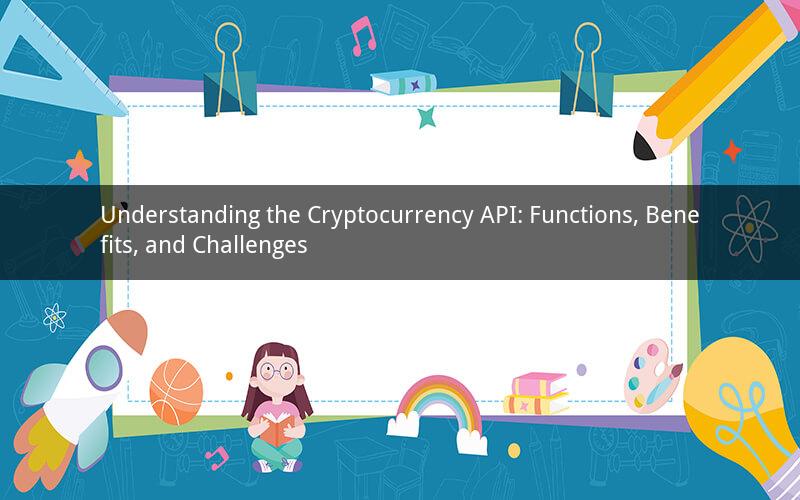
The cryptocurrency world has evolved rapidly over the years, attracting a growing number of investors and developers. As a result, the need for a comprehensive understanding of the various technologies and tools that power the cryptocurrency ecosystem has become increasingly important. One such technology is the Application Programming Interface (API), which plays a vital role in the development and integration of cryptocurrency-related applications. In this article, we will explore what a cryptocurrency API is, its functions, benefits, and challenges.
What is a Cryptocurrency API?
A cryptocurrency API is a set of programming interfaces that allows developers to interact with cryptocurrency exchanges, wallets, and other cryptocurrency-related services. In simpler terms, it is a bridge between the cryptocurrency ecosystem and the applications that developers create. By using an API, developers can access real-time data, execute trades, and perform other operations on the blockchain network.
Functions of a Cryptocurrency API
1. Real-time Data Access: One of the primary functions of a cryptocurrency API is to provide real-time data about various cryptocurrencies, including price, market capitalization, trading volume, and other relevant metrics. This enables developers to create applications that can display up-to-date information about cryptocurrencies.
2. Trading Operations: Cryptocurrency APIs allow developers to perform trading operations on exchanges, such as placing buy/sell orders, retrieving order history, and monitoring trade executions. This functionality is essential for creating trading platforms, bots, and other applications that require real-time trading capabilities.
3. Blockchain Interactions: A cryptocurrency API enables developers to interact with the blockchain network, such as retrieving transaction history, generating new addresses, and validating transactions. This functionality is crucial for building decentralized applications (dApps) and other blockchain-based services.
4. Wallet Integration: Cryptocurrency APIs can facilitate the integration of wallets into various applications, allowing users to manage their digital assets, receive and send transactions, and monitor their wallet balance.
5. Analytics and Reporting: Cryptocurrency APIs can provide valuable insights into market trends, user behavior, and other metrics. This information can be used to create applications that offer advanced analytics, reporting, and other data-driven services.
Benefits of Using a Cryptocurrency API
1. Time and Cost Efficiency: Using a cryptocurrency API saves developers time and effort by providing ready-to-use functionalities, rather than building everything from scratch. This can reduce development costs and accelerate the time-to-market for new applications.
2. Access to Real-time Data: Cryptocurrency APIs offer access to real-time data, enabling developers to create applications that are always up-to-date with the latest market trends and user behavior.
3. Enhanced User Experience: By integrating cryptocurrency functionalities into their applications, developers can enhance the user experience, making their services more valuable and competitive.
4. Scalability and Flexibility: Cryptocurrency APIs are designed to be scalable and flexible, allowing developers to adapt their applications to changing market conditions and user needs.
5. Developer Community and Support: Many cryptocurrency APIs come with a strong developer community and support, making it easier for developers to troubleshoot issues and get assistance when needed.
Challenges of Using a Cryptocurrency API
1. Security Concerns: Cryptocurrency APIs can be vulnerable to security breaches, such as unauthorized access, data theft, and other cyber threats. Developers must ensure that their applications are secure and follow best practices for data protection.
2. Regulatory Compliance: Cryptocurrency APIs must comply with various regulations, such as anti-money laundering (AML) and know your customer (KYC) requirements. This can be challenging, especially for developers who are new to the industry.
3. API Limitations: Cryptocurrency APIs may have limitations in terms of functionality, performance, and support. Developers must carefully choose the right API for their needs and be prepared to deal with potential limitations.
4. Market Volatility: The cryptocurrency market is highly volatile, which can affect the performance and reliability of applications that rely on cryptocurrency APIs.
5. Competition: The cryptocurrency API market is becoming increasingly competitive, with numerous providers offering similar services. Developers must differentiate their applications and provide unique value to stand out from the competition.
Frequently Asked Questions
1. What is the difference between a cryptocurrency API and a blockchain API?
Answer: A cryptocurrency API focuses on interactions with cryptocurrency exchanges, wallets, and other related services, while a blockchain API enables developers to interact with the blockchain network itself, such as retrieving transaction history and generating new addresses.
2. Can a cryptocurrency API be used to create a decentralized application (dApp)?
Answer: Yes, a cryptocurrency API can be used to create dApps by enabling developers to interact with the blockchain network and perform various operations, such as executing smart contracts and managing decentralized services.
3. How secure are cryptocurrency APIs?
Answer: The security of cryptocurrency APIs depends on various factors, including the implementation, the level of encryption, and the security practices of the API provider. Developers must ensure that their applications are secure and follow best practices for data protection.
4. Can a cryptocurrency API be used for fiat-to-crypto conversions?
Answer: Yes, some cryptocurrency APIs offer fiat-to-crypto conversion functionalities, allowing developers to integrate this feature into their applications.
5. Are there any limitations to using a cryptocurrency API?
Answer: Yes, cryptocurrency APIs may have limitations in terms of functionality, performance, and support. Developers must carefully evaluate the capabilities and limitations of the API they choose and be prepared to adapt their applications accordingly.